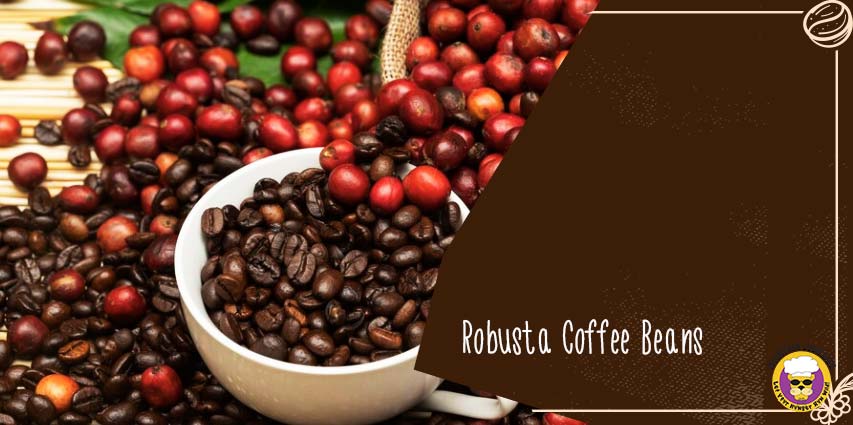Robusta Coffee is a separate type of coffee, different from Arabica, with unique characteristics. As a crop, it is easy to force it to grow in suboptimal conditions, so there are quite a few poor quality Robusta varieties out there. However, when grown with the care it deserves, a gourmet crop, Robusta yields a delicious, rich, high-caffeine coffee that stimulates your palate. your taste buds.
People around the world, including the United States, are evenly divided between “anterior palate” and “posterior palate” people. We find that people who respond well to Vietnamese coffee in general tend to be aftertaste people, while Robusta mainly stimulates the back of the palate. If you often find Arabica coffee too weak or unpalatable, you may have a weak palate.
What Is Robusta Coffee?
Robusta coffee, also known as Coffea canephora, is a species of coffee plant that is grown primarily in Central and Western Africa, Southeast Asia, and Brazil. It is the second most popular type of coffee after Arabica, accounting for about 40% of global coffee production. Unlike Arabica, which is primarily used for specialty coffee, Robusta is mainly used for instant coffee and blends. However, this does not mean that Robusta is inferior in quality. In fact, it has its own unique characteristics and benefits that have made it a popular choice among coffee lovers.
What Does Robusta Coffee Taste Like?
The taste of coffee is subjective, and each person’s palate is different. However, there are some general characteristics that can be attributed to Robusta coffee. Compared to Arabica, Robusta has a stronger and more bitter taste. This is due to its higher caffeine content, almost double that of Arabica. Some people may find this bitterness off-putting, but others enjoy the bold and intense flavor of Robusta.
One of the main reasons why Robusta is often used in instant coffee is because it has a higher solubility than Arabica. This means that it dissolves easily in hot water, making it convenient for quick coffee fixes. However, this high solubility also affects the taste of Robusta, giving it a slightly burnt or rubbery aftertaste. To combat this, some producers use a process called “monsooning,” where the coffee beans are exposed to moisture for several months, resulting in a mellow and more balanced flavor.
Health Benefits of Robusta Coffee
Coffee, whether it’s Arabica or Robusta, has been studied extensively for its potential health benefits. While both types of coffee contain antioxidants and other beneficial compounds, Robusta has been found to have a higher concentration of caffeine and chlorogenic acid, which are two of the main compounds responsible for its health benefits.
Boosts Energy and Alertness
As mentioned earlier, Robusta coffee has almost double the caffeine content of Arabica. This means that a cup of Robusta can provide a stronger and longer-lasting energy boost compared to a cup of Arabica. Caffeine works by blocking the effects of adenosine, a chemical in the brain that causes drowsiness. This leads to increased alertness, improved focus, and reduced fatigue.
Aids in Weight Loss
Caffeine has also been linked to weight loss due to its ability to increase metabolism and suppress appetite. Studies have shown that caffeine can increase the body’s metabolic rate by 3-11%, which can lead to more calories burned throughout the day. Additionally, caffeine has been found to decrease appetite and increase feelings of fullness, leading to reduced calorie intake.
Rich in Antioxidants
Antioxidants are compounds that protect the body against damage from harmful molecules called free radicals. Coffee, particularly Robusta, is a rich source of antioxidants, including chlorogenic acid, quinic acid, and caffeic acid. These compounds have been linked to various health benefits, such as reducing inflammation and lowering the risk of chronic diseases like type 2 diabetes and heart disease.
Read more: Latte vs Mocha
Robusta Coffee for Espresso: A Perfect Pair
Traditionally, Arabica has been the go-to choice for espresso due to its milder and sweeter flavor profile. However, Robusta has gained popularity among baristas and coffee enthusiasts for its strong and bold taste, making it a perfect pairing for espresso.
One of the main challenges when making espresso with Robusta is its higher caffeine content, which can result in a more bitter and harsh taste if not extracted properly. Therefore, it is crucial to use the right brewing method and equipment when working with Robusta beans. Many coffee shops use commercial-grade espresso machines that are specifically designed to handle high-pressure extraction, resulting in a well-balanced and flavorful espresso shot.

I’m Kara Chavez, and I love coffee. I like to create some of the best coffees around – espressos, lattes, macchiatos . I strive for perfection in my coffee-making skills, and I take great pride in providing a delicious cup of joe to my customers.
I’ve been working in the coffee industry for years now, and I know everything there is to know about making a perfect cup of coffee. My passion for coffee shines through in every cup that I make, and I hope that you’ll stop by soon so that I can share my love of coffee with you!

